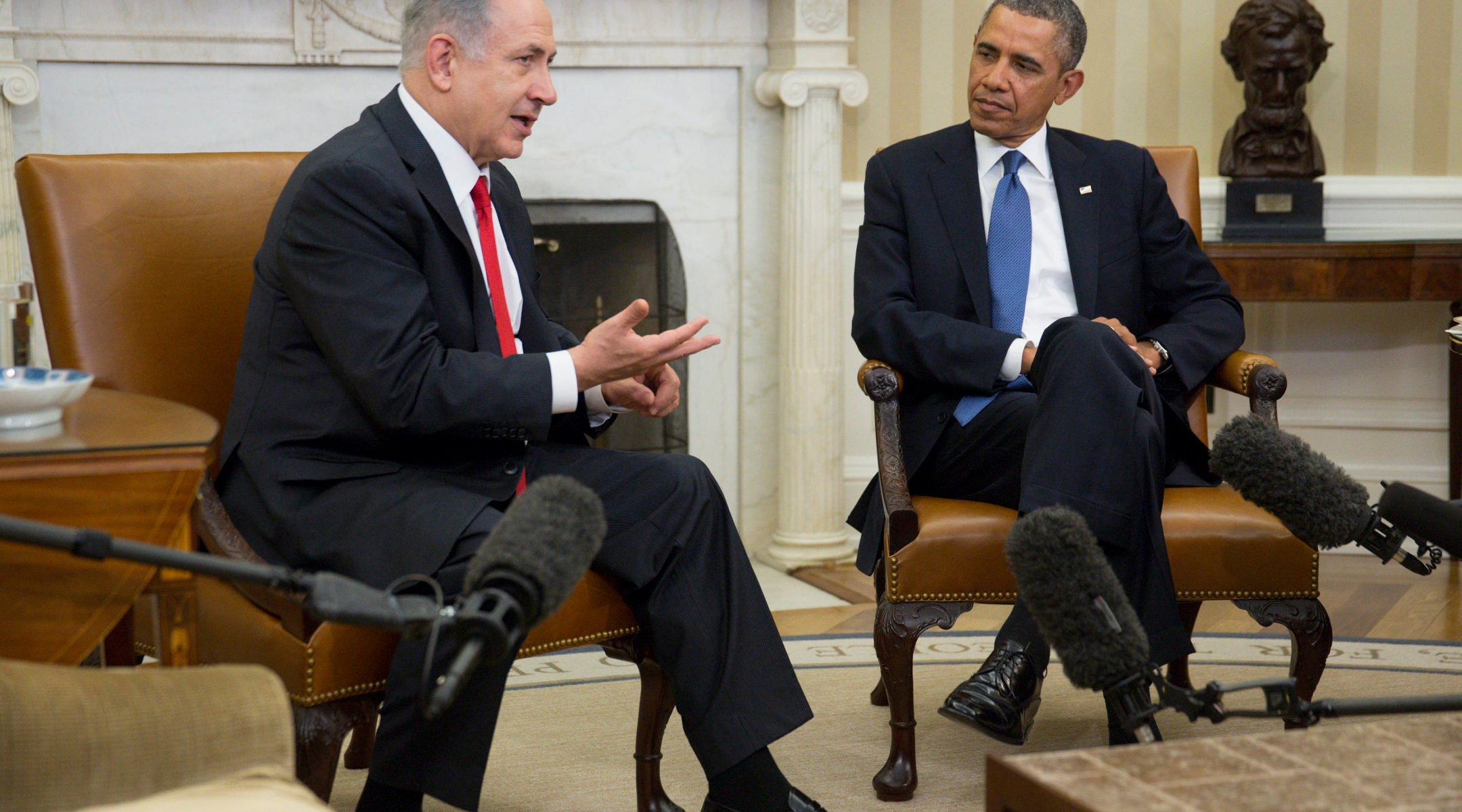(JTA) – All is not well in the U.S.-Israel relationship.
Somehow, the 50 days of fighting between Israel and Hamas frayed ties between Washington and Jerusalem.
How did this happen? In part, the contretemps stems from the divergent ways that the Israeli and U.S. administrations view the Gaza war.
Here’s where each side is coming from:
In the eyes of the U.S. administration …
While Israel’s security concerns vis-a-vis Gaza are legitimate, the ferocity of Israel’s response against Hamas in Gaza went too far. Furthermore, Israel’s diplomatic behavior during the crisis – especially leaks of private communications from Secretary of State John Kerry – undermined U.S. trust in Israeli officials.
If the United States is to continue to come to Israel’s defense in international arenas – to say nothing of sending arms to Israel and pressing Iran on the nuclear issue – the Israeli government is going to have to play ball and demonstrate it really wants a two-state solution. Israel’s seizure of 1,000 acres of West Bank land on Sunday does precisely the opposite – buffeting the argument made by some U.S. officials in May that the Israelis, rather than the Palestinians, deserve the blame for the breakdown of peace negotiations in April.
Let’s start with Israel’s assault in Gaza. Despite Israeli claims, the civilian death toll – including some 500 Palestinian children – and Israel’s apparent use of regular artillery shells rather than just precision munitions belied Israel’s claims that it was doing its utmost to limit Palestinian civilian casualties. There were just too many Palestinians dead and too much infrastructure destroyed – not to mention those strikes on U.N. schools sheltering civilians, bombardment of hospitals and the shooting of kids playing on the Gaza beach. Israel either deliberately struck some civilian targets or was negligent in taking the necessary precautions to prevent civilian casualties.
In July, the White House took the extraordinary step of halting delivery of U.S.-made Hellfire missiles to Israel. Why? For one thing, the Obama administration did not want to be seen as abetting the killing of Palestinian innocents. (The $225 million bill providing extra funding for Iron Dome, which President Obama signed, was considered kosher because it was for defense rather than offense).
For another, the Obama administration was angry over the Israeli treatment of U.S. officials during the conflict. When in mid-July Kerry sent Israeli Prime Minister Benjamin Netanyahu a confidential draft of a document outlining Hamas and Israel’s demands for ending the conflict, the Israelis misrepresented the draft as an American cease-fire proposal, put it up for a Cabinet vote (unanimously rejected) and leaked it to the press. One Israeli editor called it an “American betrayal.”
This infuriated the Americans. The breach of diplomatic protocol represented merely the latest obstruction in the long-troubled relationship between Netanyahu and Obama.
The Americans have serious doubts about Netanyahu’s commitment to a two-state solution. Rather than aggressively pursuing a deal with Palestinian Authority President Mahmoud Abbas, arguably the most moderate leader the Palestinians have ever had, Netanyahu has undermined him at every turn, looking for excuses to avoid advancing the peace track with the Palestinian Authority.
The war should be a lesson to Israel of the perils of the failure to pursue peace. Netanyahu should strengthen Abbas’ hand as a counterpoint to Hamas to demonstrate that diplomacy yields more fruit than violence. Instead, he’s scuttling the two-state solution. Case in point: the 1,000-acre land grab in the West Bank, which the Israeli organization Peace Now called Israel’s largest seizure of Palestinian land since the 1980s.
“We are deeply concerned about the declaration of a large area as ‘state land’ to be used for expanded settlement building,” State Department spokeswoman Jen Psaki said Tuesday. “We have long made clear our opposition to continued settlement activity. We call on the government of Israel to reverse this decision.”
In the eyes of the Israeli government …
The Americans just don’t get it.
The Middle East is burning. Islamic terrorists are on the march everywhere from Iraq and Syria to Libya. Hamas is Israel’s ISIS, and for Israel the threat is immediate and constant. What nation should tolerate the firing of thousands of missiles on its citizens by a radical Islamic terrorist group on its doorstep?
But Israel is held to an impossible standard when it comes to its fight against these radical Islamists, and Hamas is treated as an equal party rather than the terrorist organization that it is.
One of the main reasons the casualty count in Operation Protective Edge was so lopsided is because Israel spent its money on a missile defense system and building bomb shelters while Gaza’s rulers spent the Palestinians’ money on terror tunnels and rockets. Moreover, Hamas is to blame for the Palestinians’ civilian casualties. Hamas hid behind civilians not just to make it more difficult for Israel to target Hamas fighters, but because every Palestinian civilian death bolsters the international isolation of Israel.
As for specific errant strikes in Gaza, the Israel Defense Forces cannot provide details that might reveal sensitive operational affairs or expose Israeli soldiers to prosecution by international bodies known to have an axe to grind with Israel.
The Gaza conflict drove home two more salient points for the Israeli government.
One, it would be foolhardy to withdraw from the West Bank the way Ariel Sharon withdrew from Gaza, lest the same terrible outcome of Hamas conquest, rockets and terrorism occur in the West Bank, which is much closer to Israel’s major population centers. This is why in any final settlement the Palestinian state must be demilitarized and Israel must maintain the strategically vital Jordan Valley.
Two, the worldwide reaction to the conflict underscores more than ever the need for Israeli self-reliance. Hamas, a radical Islamic group that oppresses its own people, publicly executing alleged collaborators and with a history of suicide bombings against civilians, seemed to come under less public criticism than Israel, a democratic state with an army that does more than any military in the world to avoid civilian casualties.
The anti-Semitic surge in Europe and widespread condemnation of Israel show that criticism of Israel has more to do with logic-defying hatred of the Jews and Israel than anything else.
Even Israel’s best friend and closest ally, the United States, cannot be relied upon. The Obama administration took the highly unusual step in July of halting a weapons shipment to Israel – in the midst of a war, no less. In May, U.S. officials blamed Israel for the breakdown of Israeli-Palestinian talks when it was the Palestinian Authority that had just signed a unity agreement with Hamas, a terrorist organization. And the United States continues to make what Netanyahu called a “historic mistake” by pursuing talks with Iran while the Islamic Republic continues its clandestine march toward nuclear weapons.
(As far as the spat over the leaked Kerry cease-fire document in July, it’s not clear whether Israeli officials deliberately misrepresented the document so they could prolong the campaign against Hamas, leaked the document to take a swipe at Kerry or genuinely believed the United States was floating a cease-fire that backed Hamas demands.)
As for Sunday’s land appropriation, it’s in an area of the West Bank near the Gush Etzion settlement bloc, which Israel plans on keeping as part of any final deal with the Palestinians. And after the traumatic kidnapping and killing in June of three Israeli teens in that same West Bank area, there’s a message here to the Palestinians: Violence against Israel will be punished, not rewarded. (It’s also a sign of the political pressure Netanyahu is feeling from his right flank.)
Finally, and this is no small point: If the world is going to condemn Israel no matter what it does, then Israel should do what it believes is in its best interests, international opinion be damned.






